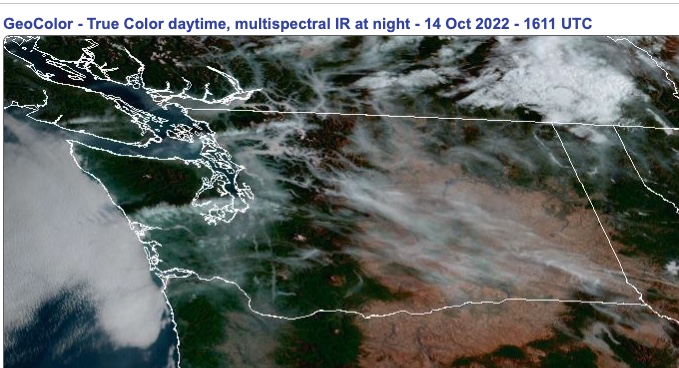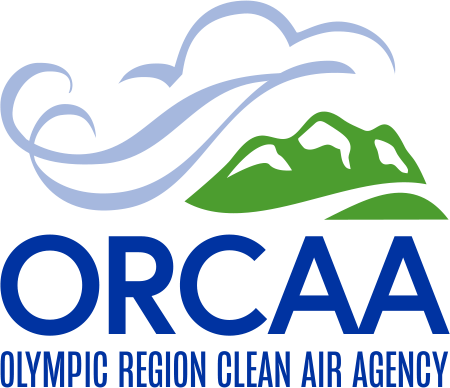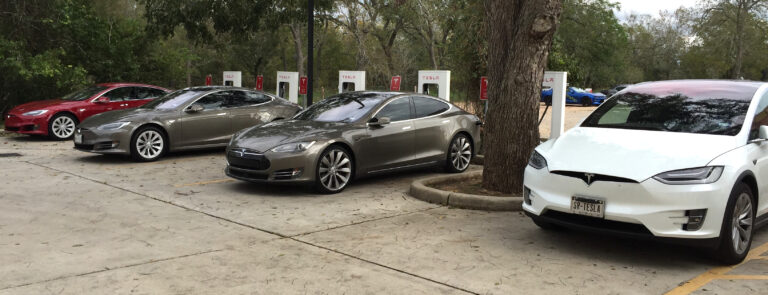
Wildfire smoke from fires around the Pacific Northwest has settled into western Washington, and it will likely linger through the weekend and even into early next week.
In the interest of public health and safety, all residents are asked to refrain from both indoor and outdoor burning. In addition to minimizing the use of woodstoves and fireplaces, ORCAA asks homeowners to use alternative means of disposal to clean up their yards. Chipping and composting are the best options, though other alternatives to burning are also available. You can find more details on the options by calling your local waste disposal company.
Wildfire Smoke
Smoke from the forest fires in eastern Washington moved into our region Friday, and it will be around for a couple more days. The Air Quality Index (AQI) rating for Clallam, Grays Harbor, Jefferson, Mason, and Thurston Counties ranges from Green to Orange – that is good to unhealthy for sensitive groups (USG) – on Friday evening, but strong east winds could bring more smoke from the fires in the Cascades out onto the Olympic Peninsula.
See current Air Quality Conditions here: https://www.www.orcaa.org/air-quality/current-air-quality/
Detailed information from DOH on how residents can best deal with wildfire smoke impacts. That information can be found here: https://www.doh.wa.gov/CommunityandEnvironment/AirQuality/SmokeFromFires
What can I do to protect myself and my family from outdoor smoke?
- CURTAIL ALL BURNING! To reduce smoke, avoid creating any fires, including recreational fires. Even where legal, recreational fires should NOT be ignited until fire and air quality conditions improve.
- Check local air quality reports and listen to news or health warnings for your community.
- Avoid physical exertion outdoors if smoke is in the air.
- If you have asthma or other lung diseases, make sure you follow your doctor’s directions about taking your medicines and follow your asthma management plan. Call your healthcare provider if your symptoms worsen.
- Stay indoors and keep indoor air as clean as possible. Take the following steps when indoors:
- Keep windows and doors closed. Track the air quality and open your windows for fresh air when the air quality improves. Pay attention to the heat indoors and follow the guidance in the section below if it’s too hot.
- Use an air cleaner with a high-efficiency particulate air (HEPA) filter to reduce indoor air pollution. A HEPA filter will reduce the number of irritating fine particles in indoor air. A HEPA filter with charcoal will help remove some of the gases from the smoke. Do not use an air cleaner that produces ozone. See California’s air cleaning devices for the home fact sheet (PDF).
- Don’t add to indoor pollution. Don’t use food broilers, candles, incense, fireplaces, or gas stoves. Don’t vacuum unless your vacuum has a HEPA filter, because vacuuming stirs up particles already inside your home. Don’t smoke, because smoking puts even more pollution into the air.
- Consider leaving the area if the air quality is poor and it’s not possible to keep indoor air clean, especially if you or those you are caring for are having health problems or are in a sensitive group.
Washington’s complete network of Air Monitoring Stations — including those managed and maintained by ORCAA — and the direct impacts of wildfire smoke can be found here: https://fire.airnow.gov/
Additional information on wildfires and smoke from wildfires is available at http://wasmoke.blogspot.com/
ORCAA will continue to monitor this possible smoke event and will report any changes of note.

